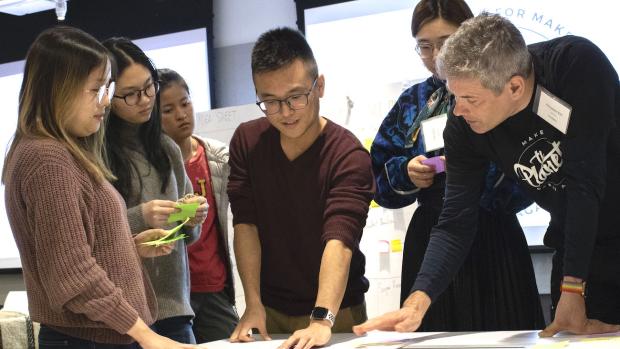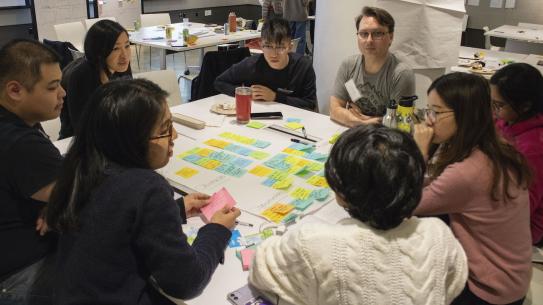20 students had 48 hours to solve the impossible — climate change
The NYU x Make The Planet Great Again Hackathon decided not to award a winner to promote collaboration as the key to long-term change

From November 16-17, the Design Lab @ NYU Tandon MakerSpace partnered with Make The Planet Great Again (MTPGA) to host a 48-hour hackathon. Centered around pressing environmental concerns, climate change was picked as the theme of this year’s hackathon, with a particular focus on human behavior.
On the first day, Peter Schwarzenbauer of BMW AG, the MTPGA team and their two sponsored projects introduced themselves and explained the goals and methods of the hackathon. Divided into teams, the students had the whole day to complete different exercises, brainstorm concrete goals and identify possible obstacles. Professionals from the MTPGA team also circulated, offering insights and guidance. The following day, the students prepared presentations of their solutions and presented them to the jury, all qualified as social entrepreneurs and experts across the industry. Professor Anne-Laure Fayard was one of the six jury members. Together with Christina Lafontaine and Victoria Bill from the Design Lab @ NYU MakerSpace, they saw the intersection between this year’s hackathon theme and the overall mission of MakerSpace and was excited to make this opportunity for students come to fruition.
"The NYU x Make The Planet Great Again Hackathon was an exciting opportunity for us at the Design Lab @ NYU MakerSpace to engage students in thinking more about issues about climate change and sustainability,” Professor Fayard said. “This is very much in line with our focus at the Design Lab on sustainability and circular design.”
While the ending of the hackathon initially promised an awards ceremony highlighting a top solution, the MTPGA organizers in agreement with the jury radically decided not to award a sole winner. As the goal of the hackathon was to consider human behavior and trigger long term change, it seemed only fitting for the jury to acknowledge all of the efforts of the students.
“I personally believe in the value of supporting grassroot ideas and experimentation,” Professor Fayard said. “This is also what we do with the Prototyping Fund and the Mini-Grants at the Design Lab. Moreover, my research on open innovation has also uncovered the power of collaboration and communities for social innovation."

Beyond awarding their communal effort, the jury proposed to support student participants who expressed interest in developing their solutions. Professor Fayard along with the rest of the jury were delighted that all of the students took the opportunity to continue working on their projects, as they were more than happy to continue providing mentoring, resources and access to funding opportunities.
Such a novel approach within the competitive world of STEM increased the enthusiasm of the participants and underscored not only the importance but the necessity of collaboration when combatting something as urgent and encompassing as the issue of climate change.
Additionally, the NYU x Make The Planet Great Again Hackathon succeeded in the diverse body of students that participated. While nearly half of the students came from different programs within Tandon, the other half consisted of students from other NYU schools such as Tisch, Steinhardt and School of Professional Studies (SPS). One student, Delong Xiao, who will be attending NYU next fall, came from the National University of Singapore (NUS) through Tandon’s exchange program between the Department of Technology Management and Innovation and NUS. Beyond stressing the collaborative effort needed to make advancements for the betterment of the environment, the hackathon also highlighted the mission of MakerSpace and NYU as a whole to increase diversity within the fields of innovation and technology.
Anna De La Rosa
BS, Media, Culture, and Communication
Class of 2021


